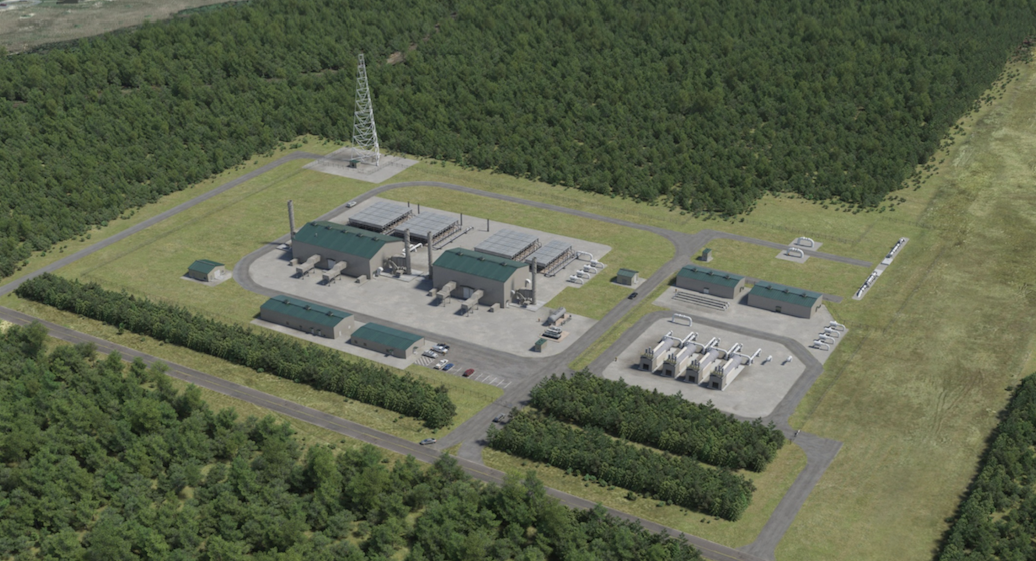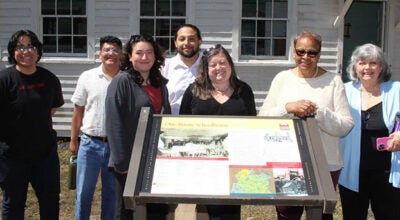Supervisors, ACP face suit over compressor station
Published 4:48 pm Sunday, February 12, 2017

- DOMINION This rendering depicts what the 53,783-horsepower (hp) natural gas-fired compressor station, granted a special use permit by Buckingham supervisors, will look like once built. The station will lie between Shelton Store and Union Hill roads along Route 56.
A farmer who says he’ll be negatively impacted by the proposed 600-mile Atlantic Coast Pipeline (ACP) project has filed a civil suit against ACP LLC and the Buckingham County Board of Supervisors.
The 27-page document, filed in Buckingham Circuit Court in early February, Carlos Arostegui, who owns Whispering Creek Farm, a 184-acre dairy and cattle farm along the route of the proposed 42-inch natural gas pipeline, which lies about 2,175 feet from the site of the proposed 53,783 horsepower compressor station, claims the issuance of a special use permit for the station violated the county’s Zoning Ordinance and the permit was “unreasonable, arbitrary, capricious, and not fairly debatable.”
The lawsuit filed represents one side of a legal argument.
The suit requests the court declare the station’s special use permit void, the compressor station “not a public utility booster station and is not among the land uses permitted in the A-1 Agricultural Zoning District by the Buckingham County Zoning Ordinance …(,) declare that the Board of Supervisors acted beyond the scope of its authority by issuing the January 11, 2017 special use permit for the Buckingham Compressor Station in violation of the Buckingham County Zoning Ordinance and the Zoning Act (and) … declare that the Board of Supervisors acted arbitrarily, capriciously, and beyond fair debate as to reasonableness in issuing the … special use permit. …”
County supervisors approved a special use permit for the gas-fired compressor station in early January.
The 5-0-2 decision came after 76 people spoke during a public hearing on the permit application. Seven of the 76 spoke in favor of the permit, while the remainder opposed the measure.
According to Dominion External Affairs Manager Carla Picard, the compressor station will be “one of the best stations in the system,” citing there are 109 compressor stations in six states that Dominion operates. She said the station would be “highly regulated” with “layers of additional vigor,” citing the conditions placed on the permit application.
Dominion is the energy firm leading ACP LLC, which is seeking federal approval of the 600-mile natural gas pipeline. If approved, the pipeline would begin in West Virginia, span Virginia and end in North Carolina. The pipeline would cross Buckingham, Cumberland and Prince Edward counties.
The compressor station is sited for a parcel of property along Route 56 between Shelton Store and Union Hill Roads.
According to the suit, Arostegui “possesses interests adversely impacted by the Board’s issuance of the … special use permit for the (compressor station),” creating an actual and justiciable controversy. “Arostegui is aggrieved by the Board’s issuance of a special use permit for the Buckingham Compressor station … (and) has a ‘direct, immediate, pecuniary, and substantial interest’ in the Board’s decision to issue the permit.”
The station, according to the suit, “will harm Mr. Arostegui’s personal and/or property rights and will impose burdens on him and his property different from any burdens suffered by the general public. These harms include diminution in property value; difficulty in selling or leasing his property; and interferences with his legitimate use and enjoyment of his property due to, among many other things: increased noise on his property, physical trespass of pollutants onto his property, increased risk of health problems due to inhalation of pollutants on his property, intrusion of obnoxious odors onto his property, increased farm and/or homeowners’ insurance premiums, adverse impacts to viewsheds from his property, and/or adverse impacts to the rural and agrarian character of the area surrounding his property.”
According to the suit, ACP LLC “proposes to install components of its transmission pipeline under Mr. Arostegui’s property. Mr. Arostegui has not granted and does not intend on voluntary grant an easement permitting the installation of those components. As such, Mr. Arostegui alleges, upon information and belief, that (ACP LLC), will seek to acquire an easement through eminent domain proceedings, which would encumber his property so as to allow the installation and operation of underground components.”
In the “legal framework” portion of the suit, Arostegui explains Virginia’s Dillion Rule governance model, the Virginia Planning, Subdivision of Land and Zoning Act, roles of planning commissions, the county’s Comprehensive Plan and zoning.
“The Buckingham County Zoning Ordinance does not list ‘gas transmission facility’ or ‘non- utility booster station,’ as use permitted by right on by special use permit within the A-1 Agricultural District,” Arostegui alleges.
The suit cites specific air pollutants that would be emitted from the station, including nitrogen oxides, carbon monoxide, volatile organic compounds, sulfur dioxide and particulate matter, citing the effects the emissions could have on Arostegui.
The suit sites that the county’s zoning ordinance permits “public utility booster or relay stations” with A-1 Agricultural Districts with special use permits. “The proposed Buckingham Compressor Station is not a ‘public utility booster or relay station’ because (ACP LLC) is not a public utility and because the Station is not a component of a public utility distribution system or other system providing utility gas under Virginia law. The proposed Buckingham Compressor Station is, instead, a non-public utility booster station and/or a natural gas transmission facility.”
Arostegui is represented by Evan D. Johns and Isak Howell of Appalachian Mountain Advocates in Charlottesville.
Howell, Arostegui and County Attorney E.M. Wright declined comment on the suit. ACP spokesman Aaron Ruby couldn’t be reached for comment.
A court date has not been set for the suit.
Supervisors approved the permit with 41 conditions, which address a wide variety of topics related to the station, including horsepower limits, emergency response, air quality studies and emissions tests, installation of fire breaks, a backup emergency communications system, compliance with the permit, staffing and use of silencers and noise. Conditions include a minimum of one employee, contractor or third-party security staffer be present onsite 24/7 during the first year of operation, installation of a backup system for monitoring communications and emergency notifications, a third-party firm conducting air quality studies and emissions tests, development of a crisis response plan, the collapse of structures within subject property lines and grass or gravel fire breaks between the facility and adjacent properties.
In late December, Federal Energy Regulatory Commission (FERC), which has regulatory approval of the project, released its draft environmental impact statement (EIS) regarding the proposed pipeline, concluding the project’s impact would be “less than significant.”





